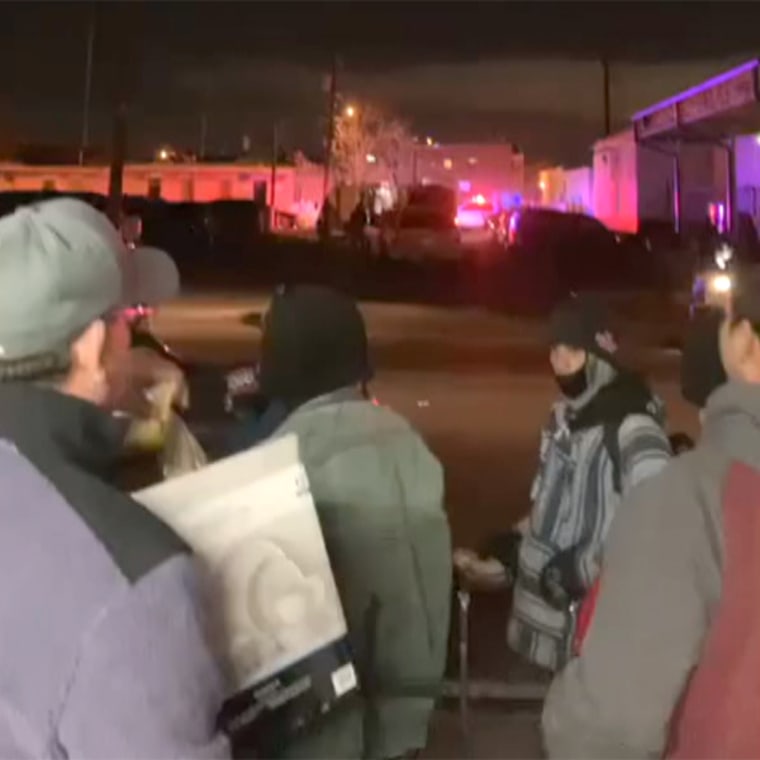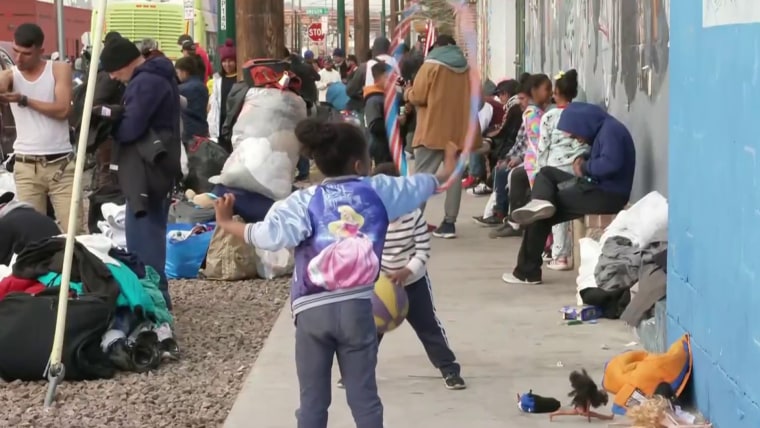[ad_1]
In the week before President Joe Biden’s trip to El Paso, Texas, Customs and Border Protection officers, as well as El Paso city police, began arresting migrants sleeping in the streets outside a Catholic church shelter and bus station, according to new footage obtained by NBC News.
In the videos, border agents can be seen patrolling the streets on Tuesday night, driving up in vans with flashing lights and rustling tents where families were sleeping. Immigration advocates say the proximity of the arrests to a church shelter may violate the Department of Homeland Security’s policies.
The person who shot the videos, a volunteer at the shelter, estimated to NBC News that approximately 100 to 150 migrants had been arrested and that more migrants sleeping by the bus station were taken into custody later in the week.

In one video, migrants huddle around a man praying loudly: “Cover us, Father! In the name of Jesus, sir. They are people, sir, who are looking for your salvation, sir. They come looking for a better future, sir. We respect the laws, sir …Father, you have the power to protect us.”
In a statement, Customs and Border Protection in El Paso said the arrests are in response to migrants evading apprehension in the El Paso area.
“CBP, which is responsible for securing the U.S. border between ports of entry, uses a layered approach that includes patrolling the border itself, nearby areas and neighborhoods, and conducting checkpoints,” a spokesman for the agency in El Paso said. “In response to migrants evading apprehension in the El Paso area, the United States Border Patrol has increased the number of agents patrolling the area.”
The number of migrants crossing into El Paso reached record highs, as many as 2,500 per day, in mid-December, but has since slowed, according to Border Patrol officials.
During the surge, migrants began arriving at the shelter run by Sacred Heart Church but some were turned away when the shelter became too full, leaving children sleeping on the streets as temperatures plunged below zero the week before Christmas. The city has since opened more facilities to house migrants, though many have continued to sleep outside the church and by the bus station.
A Border Patrol official told NBC News those arrested had not been previously apprehended by Border Patrol when they crossed over from Juarez, Mexico. They were taken to El Paso’s processing center for migrants, where they spent the night, the official said. From there they were either sent back to Mexico under Title 42, a Covid-19 border restriction temporarily held in place by the Supreme Court, or given a date to appear in court in the U.S.
The Biden administration announced new plans on Thursday to increase the number of migrants who can be turned back into Mexico under Title 42.
Biden is expected to tout the plan, which also opens up more pathways for legal migration, in his visit to El Paso on Sunday.
The location of the arrests outside Sacred Heart Church may be in violation of the Department of Homeland Security’s guidance, according to Lisa Graybill, vice president of law and policy at the the National Immigration Law Center.
“The cynic in me contemplates the possibility that this was a cleanup action intended to showcase El Paso in a particular light and the president’s enforcement actions in a particular light,” said Graybill. “I think the irony is that what you see in this video, what we’ve been told by our partners on the ground, that is in direct contraction to the kind of reasoned and sensitive and law-abiding proposals that he made at the beginning of his administration about respecting areas like churches and organizations that are providing social services. So it’s a really painful contradiction.”
In October 2021, Secretary of Homeland Security Alejandro Mayorkas sent a memo to the heads of all DHS agencies, in part reminding them that places like houses of worship and courthouses are places where undocumented immigrants should not be arrested.
He noted that areas in proximity to those safe places may also be considered protected.
“We need to consider the fact that an enforcement action taken near — and not necessarily in — the protected area can have the same restraining impact on an individual’s access to the protected area itself,” Mayorkas said in the memo. “If indeed that would be the case, then, to the fullest extent possible, we should not take the enforcement action near the protected area.”
Didi Martinez contributed.
[ad_2]
Source link


